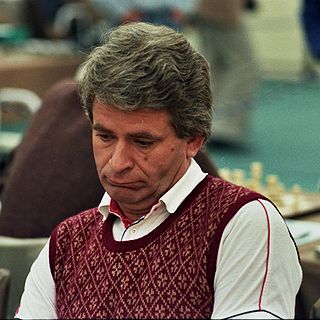
Boris Vasilievich Spassky is a Russian and former Soviet chess grandmaster who was the tenth World Chess Champion, holding the title from 1969 to 1972. Spassky played three world championship matches: he lost to Tigran Petrosian in 1966; defeated Petrosian in 1969 to become world champion; then lost to Bobby Fischer in a famous match in 1972.

Mikhail Nekhemyevich Tal was a Soviet and Latvian chess player and the eighth World Chess Champion. He is considered a creative genius and is widely regarded as one of the most influential players in chess history. Tal played in an attacking and daring combinatorial style. His play was known above all for improvisation and unpredictability. Vladislav Zubok said of him, "Every game for him was as inimitable and invaluable as a poem".
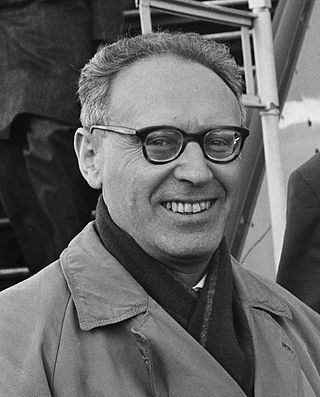
Mikhail Moiseyevich Botvinnik was a Soviet and Russian chess grandmaster who held five world titles in three different reigns. The sixth World Chess Champion, he also worked as an electrical engineer and computer scientist and was a pioneer in computer chess. He also had a mathematics degree (honorary).

Paul Keres was an Estonian chess grandmaster and chess writer. He was among the world's top players from the mid-1930s to the mid-1960s, and narrowly missed a chance at a World Chess Championship match on five occasions. As Estonia was repeatedly invaded and occupied during World War II, Keres was forced by the circumstances to represent the Soviet Union and Nazi Germany (1941–44) in international tournaments.

Leonid Zakharovych Stein was a Soviet chess Grandmaster from Ukraine. He won three USSR Chess Championships in the 1960s, and was among the world's top ten players during that era.

Jørgen Bent Larsen was a Danish chess grandmaster and author. Known for his imaginative and unorthodox style of play, he was the second-strongest non-Soviet player, behind only Bobby Fischer, for much of the 1960s and 1970s. He is considered to be the strongest player born in Denmark and the strongest from Scandinavia until the emergence of Magnus Carlsen.

Mark Evgenievich Taimanov was one of the leading Soviet and Russian chess players, among the world's top 20 players from 1946 to 1971. A prolific chess author, Taimanov was awarded the title of Grandmaster in 1952 and in 1956 won the USSR Chess Championship. He was a World Championship Candidate in 1953 and 1971, and several opening variations are named after him. Taimanov was also a world-class concert pianist.
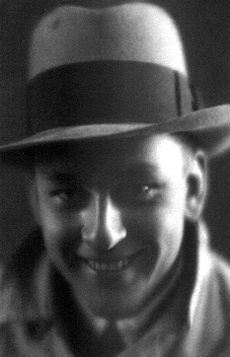
Vladas Mikėnas was a Lithuanian and Soviet chess player and journalist. He was awarded the titles of International Master and Honorary Grandmaster by FIDE.
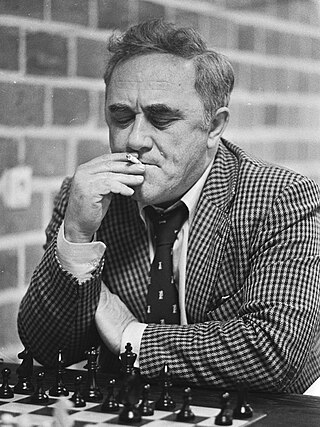
Efim Petrovich Geller was a Soviet chess player and world-class grandmaster at his peak. He won the Soviet Championship twice and was a Candidate for the World Championship on six occasions. He won four Ukrainian SSR Championship titles and shared first in the 1991 World Seniors' Championship, winning the title outright in 1992. His wife Oksana was a ballet dancer while his son Alexander was also a chess master. Geller was coach to World Champions Boris Spassky and Anatoly Karpov. He was also an author.

Yuri Lvovich Averbakh was a Russian chess grandmaster and author. He was chairman of the USSR Chess Federation from 1973 to 1978. He was the first centenarian FIDE Grandmaster. Despite his eyesight and hearing having worsened, by his 100th birthday he continued to devote time to chess-related activities.
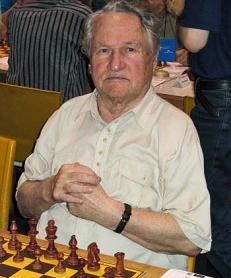
Ratmir Dmitrievich Kholmov was a Russian chess Grandmaster. He won many international tournaments in Eastern Europe during his career, and tied for the Soviet Championship title in 1963, but lost the playoff. Kholmov was not well known in the West, since he never competed there during his career peak, being confined to events in socialist countries. His chess results were impressive, so this may have been for security reasons, as Kholmov had been a wartime sailor. But he was one of the strongest Soviet players from the mid-1950s well into the 1970s, and was ranked as high as No. 8 in the world by Chessmetrics.com from August 1960 to March 1961. Kholmov stayed active in competitive chess right to the end of his life, and maintained a high standard of play past the age of 80.

Alexander Markovich Konstantinopolsky was a Soviet chess player, trainer and writer. He was a five-time champion of Kiev, and trained the world title challenger David Bronstein from a young age. He was awarded the title of International Master (IM) by FIDE in 1950, won the first Soviet Correspondence Chess Championship in 1951, earned the IM title at correspondence in 1966, and earned the title of Honorary Grandmaster in 1983.
Lev Solomonovich Aronin was a Soviet International Master of chess. He was a meteorologist by profession.
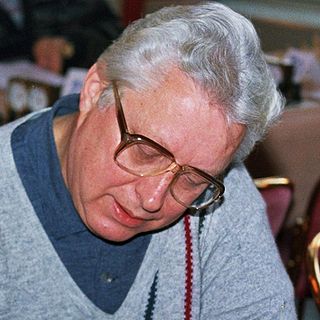
Evgeni Andreyevich Vasiukov was a Russian chess player, one of the strongest in the world during his peak. He was awarded the title of Grandmaster by FIDE in 1961. During his career, he won the Moscow Championship on six occasions and scored numerous victories in international tournaments, such as Belgrade Open 1961, Moscow International 1961, East Berlin 1962, Reykjavik 1968, and Manila 1974. He was rarely at his best in Soviet Championship Finals, which were among the very toughest events in the world, and never made the Soviet team for an Olympiad or a European Team Championship. Vasiukov won the World Senior Chess Championship in 1995.
Vladimir Alexeyevich Alatortsev was a Soviet chess player, author, and administrator. During his career, he became champion of both Leningrad and Moscow, and played in the Soviet Chess Championship finals nine times, with his best competitive results in the 1930s. He placed clear second in the 1933 Soviet final. He retired from most competitive play in the early 1950s, moving into roles as a chess organizer, teacher, and coach. He served as chairman of the All-Union chess section from 1954 to 1959 and as chairman of the USSR Chess Federation from 1959 to 1961. By profession, he was a hydraulics engineer.
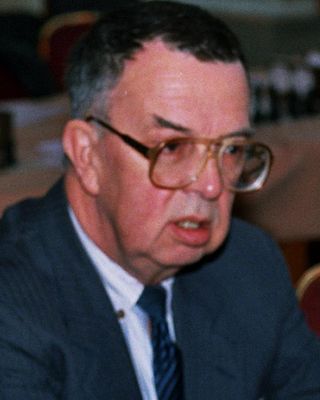
Nikolai Vladimirovich Krogius was a Russian chess Grandmaster, International Arbiter (1985), psychologist, chess coach, chess administrator, and author. He won several tournament titles at Sochi and in Eastern European events, and appeared in seven Soviet finals from 1958–71. His peak was in 1967 when he ranked 18th in the world for a time. He earned his doctorate in psychology, and specialized in sports psychology. He coached World Champion Boris Spassky for several years, also served as chairman of the USSR Chess Federation, and co-authored five chess books. He was the co-winner of the 1993 World Senior Chess Championship.

Viktor Lvovich Korchnoi was a Soviet and Swiss chess grandmaster (GM) and chess writer. He is considered one of the strongest players never to have become World Chess Champion.

Vyacheslav Vulfovich Osnos was a Russian chess player, trainer and author. He was awarded the International Master title in 1965, and was champion of Leningrad in 1971 and 1980.

The 1958 Soviet Chess Championship was the 25th edition of USSR Chess Championship, held from 12 January to 14 February 1958 in Riga. The tournament was won by Mikhail Tal. The final was preceded by quarterfinals events at Tbilisi, Minsk and Ashkhabad ; semifinals at Leningrad, Sverdlovsk and Kiev.

The 1960 Soviet Chess Championship was the 27th edition of USSR Chess Championship. Held from 26 January to 27 February 1960 in Leningrad. The tournament was won by Viktor Korchnoi. The final were preceded by semifinals events at Cheliabinsk, Tallinn and Yerevan. Mikhail Tal was missing, preparing for his world title match against Botvinnik. Paul Keres was in Cuba as part of a cultural delegation from Estonia.


















